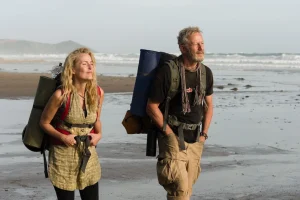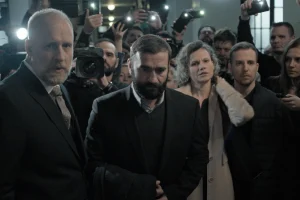An escaped convict finds himself in an unusual living arrangement within the walls of a busy toy store in Roofman, opening in Prague and cinemas worldwide this weekend. This unexpectedly tender portrayal of an unusual true story from director Derek Cianfrance (The Place Beyond the Pines), who co-wrote the screenplay with Kirt Gunn, is bolstered by a career-best performance by Channing Tatum as a man whose benevolent nature and cheerful demeanor mask a dark shadow that haunts his every step.
Roofman is based on the story of Jeffrey Manchester, a former United States Army Reserve soldier who first made headlines as a masked criminal who committed a series of spree robberies in the late 1990s. He got his nickname after his unusual modus operandi: he would break through the roofs of establishments (often McDonald’s locations) overnight and wait inside to rob workers at gunpoint in the morning.
Manchester was apprehended in 2000 and sentenced to 35 years in prison, but he would escape in mid-2004 and make headlines once again. For six months, he lived inside a Toys “R” Us location in Charlotte, North Carolina, living on snacks and baby food, his presence undetected by oblivious employees.
Adaptations of quirky true-crime stories have a tendency to overplay the comedic aspects and lose the human interest angle (see also: 30 Minutes or Less, Pain & Gain), but Roofman goes in the opposite direction. Cianfrance is a lot less interested in the peculiarities that made this case noteworthy, and more in what made Manchester tick; while even his victims described him as “nice,” there’s clearly something under the surface that prevents him from living a normal life.
Tatum stars as Manchester, who opens the film by robbing McDonald’s locations in order to afford the amenities that have put his family—a wife, young daughter, and twin infant sons—in a nice suburban house. Like George Clooney in Out of Sight, Manchester is a polite criminal, and even offers a manager (Tony Revolori) his coat before locking him in the freezer. But as former army pal Steve (LaKeith Stanfield) notes, the lack of this hard edge means that Jeff is no master criminal despite his skills, and he ultimately leads authorities right to his door.
Roofman is at its best when detailing the procedural-like elements of Manchester’s existence, and one of the film’s best scenes showcases his escape from prison and inadvertent journey into a Toys “R” Us just minutes before closing. Here, he’s able to slip into the ceiling and spend the night—and discover a location with a lack of proficient security that he’ll be able to make use of.
Jeff ultimately turns off the security camera recording, sets up a small living space for himself in the unseen area behind the bicycle display, and surreptitiously sets up baby monitors to follow the staff. Manager Mitch (Peter Dinklage) is something of a bully, but Jeff helps out cashier Leigh Wainscott (Kirsten Dunst) by hacking into the boss’s computer and changing her schedule around.
What Jeff really wants is to see his daughter, but he knows any contact will lead police right to him. So he finds another family: slipping out of the Toys “R” Us by disabling the security door, he takes the identity of John Zorn, ingratiates himself within Leigh’s church, led by pastor Ron (Ben Mendelsohn), and begins a romantic relationship with Leigh that also involves him becoming a father figure to her two teenage daughters.
Despite the armed robbery and other criminal behavior, Roofman doesn’t portray Jeff as a dangerous individual, though a bit of aggression towards some Tickle Me Elmo dolls hints at a Travis Bickle-like psychopathy. Instead, Jeff attempts genuine affection and care for those around him—all while being very much aware that he’s living a lie to suit his own desires that will only hurt these people in the end.
That lends a certain sadness to Roofman, and we’re always aware of where this story is headed, regardless of whether we’re familiar with the real-life case or not. There’s a theme here that suggests that Jeff could be successfully living life on the run, à la Frank Abagnale in Catch Me if You Can, and it’s only his desire for human connection that prevents him from being a successful criminal.
But Cianfrance knows that the opposite is also true. The things that Jeffrey wants—love, family, friendship—were always available to him, and it’s his criminal instincts that prevent him from living the normal life he so desperately desires. Most of us don’t look at a McDonald’s restaurant and see security flaws and potential access points, much less act on those impulses. But there’s something inside this man that prevents him from functioning in society, despite the benevolent exterior.
After the stylized The Light Between Oceans and The Place Beyond the Pines, Roofman represents a return to naturalistic filmmaking for the director, reuniting with Blue Valentine cinematographer Andrij Parekh. They shot the film 35mm, across autumnal locations in rural North Carolina; while the result is never flashy, it perfectly captures the feel of 1990s-2000s small town America.
In the end, Roofman is less a sensational true-crime caper than a quietly tragic character study of a man caught between decency and criminal compulsion. Cianfrance resists the urge to play up Manchester’s exploits, instead revealing how isolation and longing can distort even the most well-meaning soul. It’s a film about the limits of darkness in a decent man—but also the limits of decency in a flawed one.













